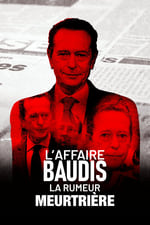Información personal
Conocido por Interpretación
Créditos conocidos 5
Sexo Masculino
Fecha de nacimiento 1 de enero de 1953 (71 años)
Lugar de nacimiento Lourdes, Hautes-Pyrénées, France
También conocido como
- -
Puntuación del contenido
100
¡Sí! ¡Buena pinta!
Iniciar sesión para informar de un problema
Biografía
Philippe Douste-Blazy (born 1 January 1953) is a French United Nations official and former centre-right politician. Over the course of his career, he served as Under-Secretary-General of the United Nations, Special Adviser on Innovative Financing for Development in the UN and chairman of UNITAID.
He previously served as French Minister for Health (1993–1995 and 2004–2005), Minister of Culture (1995–1997) and as Foreign Minister in the cabinet of Dominique de Villepin (2005–2007). He was mayor of Lourdes 1989–2000 and mayor of Toulouse 2001–2004.
Originally a member of the Centre of Social Democrats (CDS), the Christian Democrat component of the Union for French Democracy (UDF) party, he later joined the Union for a Popular Movement.
A cardiologist by profession, he became professor at Toulouse Sciences University in 1988.
Born in Lourdes in the Hautes-Pyrénées, Douste-Blazy studied medicine in Toulouse, where he had his first job in 1976. He then worked as a cardiologist in Lourdes and Toulouse, namely in Purpan's hospital from 1986. He then joined the French Society of Cardiology. He became Professor of Medicine at Toulouse Sciences University in 1988. Since 2016, he has also been a visiting professor at the Harvard T.H. Chan School of Public Health.
A member of the Centre of Social Democrats (CDS), the Christian Democrat component of the Union for French Democracy (UDF), Douste-Blazy entered politics in March 1989, being elected mayor of Lourdes. He was also elected national director of the association of research against elevations of cholesterol.
In the 1989 European elections, Douste-Blazy was elected Member of the European Parliament in June of the same year. He was then a member of the European People's Party.
During his time in parliament, Douste-Blazy served on the Committee on the Environment, Public Health and Consumer Protection. In addition to his committee assignments, he was a member of the parliament’s delegation to the Joint Assembly of the Agreement between the African, Caribbean and Pacific States (ACP countries) and the European Economic Community.
Elected deputy for Hautes-Pyrénées département in March 1993, Douste-Blazy was appointed to the cabinet of Edouard Balladur as Minister-Delegate (a junior minister) at the Ministry for Health.
In May 1994, in his capacity as minister, Douste-Blazy visited Rwanda and refugee camps in neighboring Tanzania to witness the consequences of the genocidal mass slaughter of Tutsi by members of Rwanda’s Hutu majority government. During his time in office, France approved a bill which prohibited postmenopausal pregnancy, which Douste-Blazy said was "...immoral as well as dangerous to the health of mother and child."
Douste-Blazy stayed at the ministry until the 1995 presidential election. In March 1994, he was elected at Hautes-Pyrénées's General Council. He became general secretary of the CDS in December and Government's spokesman one month later.
In May 1995, after the election of Jacques Chirac as President of France, a candidacy he was backing, Douste-Blazy was nominated Minister of Culture. In June, he was also re-elected Mayor of Lourdes then, five months later, elected general secretary of Democratic Force, the party which replaced the CDS . ...
Source: Article "Philippe Douste-Blazy" de Wikipédia en français, soumis à la licence CC-BY-SA 3.0.
Philippe Douste-Blazy (born 1 January 1953) is a French United Nations official and former centre-right politician. Over the course of his career, he served as Under-Secretary-General of the United Nations, Special Adviser on Innovative Financing for Development in the UN and chairman of UNITAID.
He previously served as French Minister for Health (1993–1995 and 2004–2005), Minister of Culture (1995–1997) and as Foreign Minister in the cabinet of Dominique de Villepin (2005–2007). He was mayor of Lourdes 1989–2000 and mayor of Toulouse 2001–2004.
Originally a member of the Centre of Social Democrats (CDS), the Christian Democrat component of the Union for French Democracy (UDF) party, he later joined the Union for a Popular Movement.
A cardiologist by profession, he became professor at Toulouse Sciences University in 1988.
Born in Lourdes in the Hautes-Pyrénées, Douste-Blazy studied medicine in Toulouse, where he had his first job in 1976. He then worked as a cardiologist in Lourdes and Toulouse, namely in Purpan's hospital from 1986. He then joined the French Society of Cardiology. He became Professor of Medicine at Toulouse Sciences University in 1988. Since 2016, he has also been a visiting professor at the Harvard T.H. Chan School of Public Health.
A member of the Centre of Social Democrats (CDS), the Christian Democrat component of the Union for French Democracy (UDF), Douste-Blazy entered politics in March 1989, being elected mayor of Lourdes. He was also elected national director of the association of research against elevations of cholesterol.
In the 1989 European elections, Douste-Blazy was elected Member of the European Parliament in June of the same year. He was then a member of the European People's Party.
During his time in parliament, Douste-Blazy served on the Committee on the Environment, Public Health and Consumer Protection. In addition to his committee assignments, he was a member of the parliament’s delegation to the Joint Assembly of the Agreement between the African, Caribbean and Pacific States (ACP countries) and the European Economic Community.
Elected deputy for Hautes-Pyrénées département in March 1993, Douste-Blazy was appointed to the cabinet of Edouard Balladur as Minister-Delegate (a junior minister) at the Ministry for Health.
In May 1994, in his capacity as minister, Douste-Blazy visited Rwanda and refugee camps in neighboring Tanzania to witness the consequences of the genocidal mass slaughter of Tutsi by members of Rwanda’s Hutu majority government. During his time in office, France approved a bill which prohibited postmenopausal pregnancy, which Douste-Blazy said was "...immoral as well as dangerous to the health of mother and child."
Douste-Blazy stayed at the ministry until the 1995 presidential election. In March 1994, he was elected at Hautes-Pyrénées's General Council. He became general secretary of the CDS in December and Government's spokesman one month later.
In May 1995, after the election of Jacques Chirac as President of France, a candidacy he was backing, Douste-Blazy was nominated Minister of Culture. In June, he was also re-elected Mayor of Lourdes then, five months later, elected general secretary of Democratic Force, the party which replaced the CDS . ...
Source: Article "Philippe Douste-Blazy" de Wikipédia en français, soumis à la licence CC-BY-SA 3.0.
Interpretación
|
||||||
|
||||||
|
||||||
|





